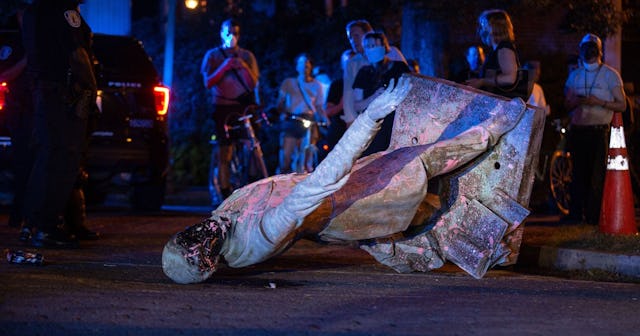Why Toppling Confederate Statues Is NOT 'Erasing History'

One thing we have a hard time admitting as Americans, it seems, is that history does exist. There are artifacts that point us in a particular direction. There are orators who share with us stories from a time long ago. There are history books that give us glimpses into a time and space we weren’t physically there to see. The statues being taken down across the United States does not in fact erase history, but instead shares a story with the future generations that we were ready, as a country, to put the past behind us.
To keep the Confederate statues up means that we continue to support a time when African Americans were slaves. Taking them down means the mission behind the Black Lives Movement is slowly being heard. Taking the statues down means that, as a nation, we are one step closer to healing and truly supporting the Black Lives Matter movement.
The Washington Post/Getty
No, history will not be erased simply by toppling over a statue or setting it on fire. It does not mean that slaves were not brought from their homeland of Africa to be forced to work, be separated from their mothers, fathers, sisters, brothers, and children to build a country that would then take centuries to end, from 1619 to 1865. From Connecticut to Missouri, calls are being heard to take down the statues of Christopher Columbus, General Robert E. Lee, and Jefferson Davis, to name a few. Taking down the statues does not negate the fact that people died in a war that was started because the North and the South could not agree to end slavery.
The removal of these statues gives us a starting point to open discussions about where we go from here. Do we truly value our fellow Americans over stone statues? Will we look into the faces of our neighbor and think about how Christopher Columbus “discovered” America? Are we that connected to inanimate objects that we devalue the existence of our family who live in the South (or North)? Can we let the shame our past as a country dictate where we go as a unified country today? No, we cannot.
Andrew Lichtenstein/Getty
The statues have been up long enough, and serve as a daily reminder to the people who built the land we call home that there are still tears in our fabric. We are not living in the land of the free when stationery stone-faced men loom on street corners around the country. Taking them down, means we are mending what was once broken. It will look and feel different to walk around a town’s square without seeing the stony face of a General, or another “martyr” who should be reserved for the history books, looming down. Removal of the statues is a small step towards taking actions that will have a lasting impact on the story we tell.
We are living through a time of resistance to righting the wrongs of our past and paving the way towards a new normal. When the removal of statues is done overnight, like in Charlottesville, Virginia, there is a kind of shame associated with its removal. This is a time when thousands of voices across the world are rising up to speak out against injustice with a call for change. This is part of the change we’ve asked for.
When the words “Black Lives Matter” are boldly spelled out on streets like in Washington, DC, and statues and monuments are removed like of Christopher Columbus and The Confederate War Memorial in Dallas, Texas, I for one, can breathe a little easier. One day, someone may want to take down the murals which have surfaced over the past few weeks from artists using their talent to express what this time in our history means to them.